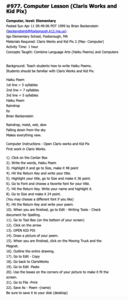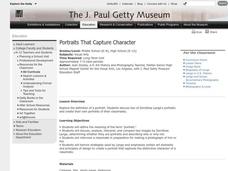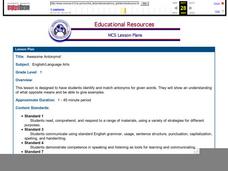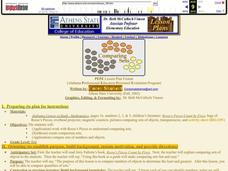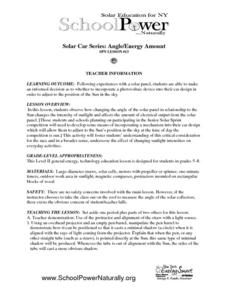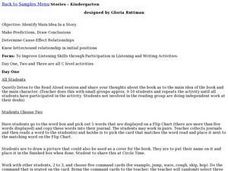NOAA
The Biggest Plates on Earth
The deepest part of the ocean is the Marianas trench where two tectonic plates meet. Scholars explore plate tectonics and their boundary types by completing hands-on activities throughout the lesson. Specific areas, such as the Galapagos...
Cornell University
Glued into Science—Classifying Polymers
Explore the unique characteristics of polymers. A complete instructional activity begins with a presentation introducing polymers. Following the presentation, young scientists develop a laboratory plan for creating substances using...
NOAA
Oceans of Energy
Are the earth's oceans really just giant batteries, waiting for their energy to be harnessed? Middle school mechanical engineers will be shocked by the amazing amount of energy that forms around them after diving into part four of a...
Cornell Lab of Ornithology
Amazing Birds
What's so amazing about birds? Find out just how amazing birds are with a physics of animal behavior unit created by Cornell Lab of Ornithology. Have learners explore and tap into their observational skills and notice how birds fly, what...
Curated OER
Computer Lesson
The writing of Haiku poems is the focus of this language arts lesson. In it, the basic elements of Haiku poetry are presented, and then a step-by-step set of instructions on how to create a Haiku poem along with an illustration is...
J. Paul Getty Trust
Portraits That Capture Character
One of the great things about technology is that it lets youngsters visit museums that may be many miles away. With this resource, middle and high schoolers can visit the portrait galleries at J. Paul Getty Museum, located in Los...
J. Paul Getty Trust
Picturing a Story: Photo Essay about a Community, Event or Issue
Picture this. Class members follow in the footsteps of W. Eugene Smith, Dorothea Lange, James Nachtwey, and Lewis Hine by creating their own photo essay about a local event or issue.
J. Paul Getty Trust
Exhibiting Common Threads
Artists working in different media often explore the same themes—to model how these same themes weave their way through different forms of artistic expression, scholars analyze images by Dorothea Lange, identifying key themes in her...
Curated OER
Awesome Antonyms
Review with your young learners what opposites are and use a fun tag board game called Auntie Alice to practice. After the class plays the game, pairs work on computers practicing with interactive matching/flashcards/concentration games...
Monroe City Schools
Clouds! Clouds! Clouds!
Here is a beautiful lesson on clouds designed for your 1st graders. Learners study three different types of clouds. They construct drawings of cumulus, cirrus, and stratus clouds. The Cloud Book, by Tommie dePaola is used to...
Curated OER
Comparing Sets
Kindergarteners and first graders work with Reese's Pieces to explain comparing sets, create comparison sets, and compare sets of numbers and objects. A good lesson that uses a "tasty" manipulative!
Curated OER
Sediment Sleuths
Are you looking for a good, solid lesson on sedimentary rocks? This one, produced by the Illinois State Museum, is just such a lesson. Middle schoolers identify common rocks and minerals by analyzing sediments from local water sources....
Curated OER
Teamwork Towers
Students work in a cooperative groups to create a free standing tower of straws and pins in ten minutes. They watch a video of the cooperative groups working, discuss the process and list the things they could do to improve the cooperation.
Curated OER
The Game is Afoot - A Study of Sherlock Holmes
Mystery is an exciting genre for young readers to investigate. The plots are so intriguing! Here is a series of lessons featuring Sherlock Holmes stories that invite learners to enter the world of the mystery genre. Based on what...
Texas State University
Earth: Deposition and Lithification
Geology geniuses analyze sediment samples with a hand lens and sort according to physical characteristics. They also learn about the processes of cementation, compaction, and lithification within the rock cycle. The lesson plan is...
Curated OER
What are Metamorphic Rocks and How are They Formed?
Even though the student handouts are not included in the write-up, this lesson contains the instructions for terrific activities to use when teaching middle schoolers about metamorphic rocks. First, they compare granite to gneiss and...
Curated OER
Using Primary Sources to Study the Holocaust
Engage your middle schoolers with Pastor Martin Niemoller's famous poem that begins, "First they came for the communists." Now that you have their attention, send learners to the various work stations you created to have them explore...
Curated OER
Rain Rain Go Away
Complete a variety of activities related to the long /a/ sound with a focus on words containing the ai and ay correspondence with your readers. As a class, they recite a tongue twister, then spell different words containing ay and ai...
Curated OER
Plate Tectonics Day 3 Sea Floor Spreading: Evidence for Continental Drift
Learners are introduced to Sea Floor Spreading and how it provides evidence for Hess's and Deitz's theory of Continental Drift. They use paleomagnetic data to calculate the rate of Sea Floor Spreading.
Curated OER
Solar Car Series: Angle/Energy Amount
Does the angle of a solar panel change the output? Emerging engineers find out! Demonstrate for your class how they can angle a straw to match the angle of light rays coming from a source. Then turn them loose to experiment with the...
Curated OER
Identify Main Idea in a Story
Help your kindergarteners identify the main idea in a story. Small groups work with the teacher to make predictions and draw conclusions. They are able to determine cause and effect relationships. The instructional activity is divided...
BBC
Sound and Hearing
First and second graders recognize that sound is generated in a variety of ways, and that it comes from many different sources. They explore tone and volume, realizing that there are different ways to describe sound. Some musical...
BBC
Light and Shadows
Light is such an amazing thing! Elementary schoolers explore the wonderful world of light and shadow. The lesson plan is meant to be carried out on a whiteboard. Objects are placed in front of a light source, and learners must predict...
BBC
Ourselves
Young biologists identify parts of the body, sort humans from other animals, and list the difference they see. Learners are split up into groups of three, and each group must find pictures in magazines of humans and other animals. They...
Other popular searches
- Magnets Word Search
- Properties of Magnets
- Activities on Magnets
- Magnets and Magnetism
- Science Magnets
- Science Magnets
- Experiments With Magnets
- Science Magnets and Springs
- Magnets and Motors
- Magnets and Electricity
- Magnets and Magnetic Fields
- Magnets and Electromagnets






